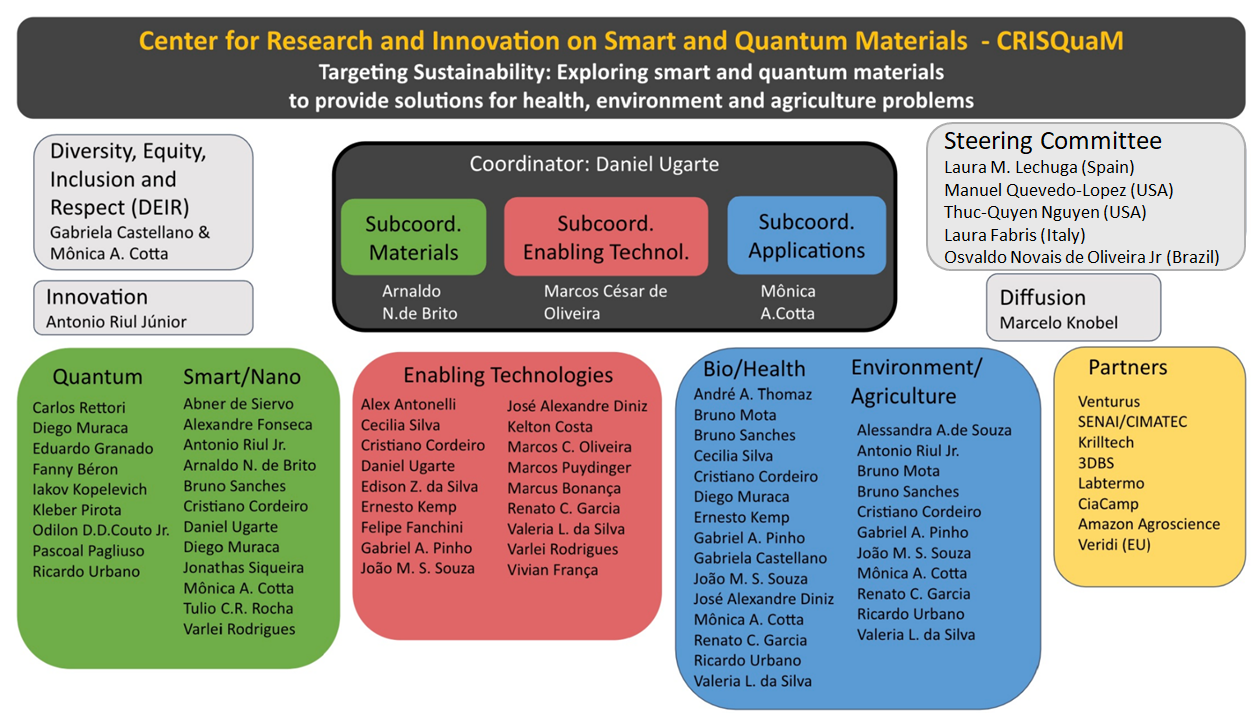BV-FAPESP: research projects supported in this Center
CRISQuaM in the Media: news about the center
CRISQuaM aims to explore the synergistic development of fundamental and applied science to create new materials with high potential for the construction of devices and sensors to address technological challenges related to sustainability, climate change, precision agriculture, ecology, and health. To achieve these goals, we have assembled an interdisciplinary and collaborative research team, integrating expertise across various scientific domains, researching novel materials with high innovation potential. By combining original synthesis methods, advanced characterization techniques, theoretical approaches, computational simulations, quantum technologies, and device construction designs, we aim to drive advances in smart and quantum materials, promoting scientific excellence and technological development. With this, we plan disruptive innovations in instrumentation—including hardware and AI-based tools—as well as in quantum technologies, biomedical devices, and signal processing, in addition to plant bionics, exploring plant-pathogen interactions. Besides research activities, we plan intensive actions in education, dissemination, and communication for the general public, as a modern society should be aware of the challenges humanity faces and how research and technology are essential for responsibly utilizing the planet's limited resources. CRISQuaM's Innovation activities are accelerated through partnerships with several companies in related technologies, many of them Brazilian. Finally, all activities of the Center are managed in accordance with diversity, equity, and inclusion goals and best practices.
The Center brings together scientists, engineers, and innovators in a collaborative effort to apply materials science and quantum technologies at the cutting edge, designing new materials and nano(bio)sensors for advanced diagnostics. The Center has a team capable of producing a wide range of (nano/micro) materials, along with precise chemical and physical characterizations using modern techniques (synchrotron, advanced microscopy, magnetotransport, magnetic resonance, optics, etc.). In addition, the team offers various options in enabling technologies, including miniaturization, processing, and additive manufacturing, as well as instrumentation, quantum sensing, and electronics development. Data analysis will employ updated approaches (numerical simulation, classical and quantum machine learning, and quantum optimization). Applications at the knowledge frontier will address urgent sustainability needs in environmental areas, precision agriculture, plant bionics, and biomedical interfaces, contributing to the development of local technologies in close partnership with the Brazilian industry.
The organization of the Center is based on three pillars — Materials, Enabling Technologies, and Applications — together with partner companies, as described in the figure below.

2023-08-02
Research conducted in manipulated sugarcane plots showed that small water bodies such as ponds and puddles can contribute to sustainable farming even with environmentally hostile practices.
2023-08-02
The first-ever study of dark kitchens conducted in Brazil collected data on 22,520 establishments located in three cities in São Paulo state and listed by iFood. An article on the study offers a profile of these delivery-only restaurants, which proliferated during the pandemic.
2023-07-26
In experiments conducted at the State University of Campinas (Brazil), intestinal epithelial stem cells proliferated more in mice fed an inulin-rich diet than in mice given insoluble fiber. The study also showed that the beneficial effects depended on interaction with gut microbiota.
2023-07-26
A team affiliated with a FAPESP-supported research center showed in mice that molecules capable of preventing the peptide C5a from binding to its cellular receptor helped prevent lung damage and other complications typical of severe COVID-19.
2023-07-26
Scientists at Brazilian Center for Research in Energy and Materials (CNPEM) investigated enzymes produced by two species of fungus used to break down sugarcane bagasse for production of second-generation ethanol. The goal of the project is to increase the efficiency of this process, which currently depends on imported feedstocks.
2023-07-26
The results pave the way for breeding of cattle with selected traits. Preliminary work findings for human embryo models recently published by international groups could contribute to the understanding of congenital defects and early pregnancy loss.
2023-07-26
An article in Science by 35 researchers affiliated with institutions in Brazil and elsewhere shows that carbon emissions resulting from forest degradation are equivalent to emissions from deforestation. The authors analyzed degradation due to fire, edge effects, illegal logging and extreme drought.